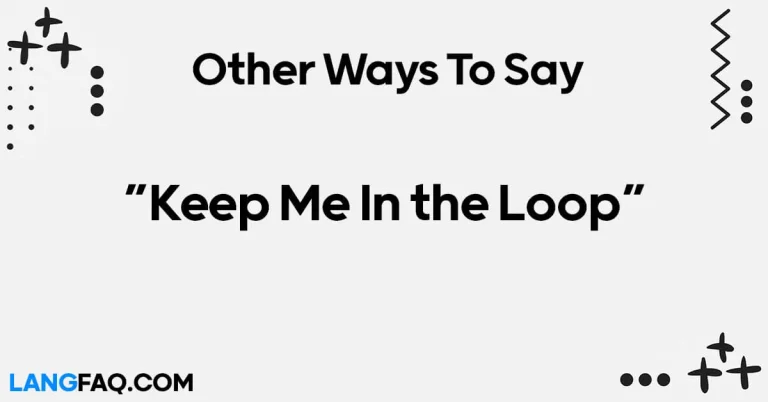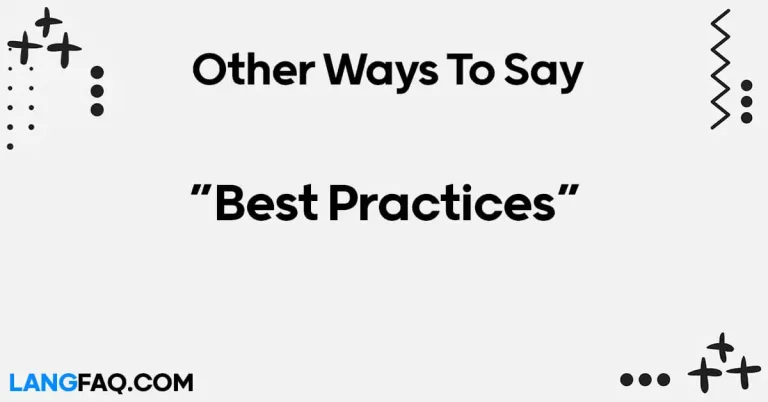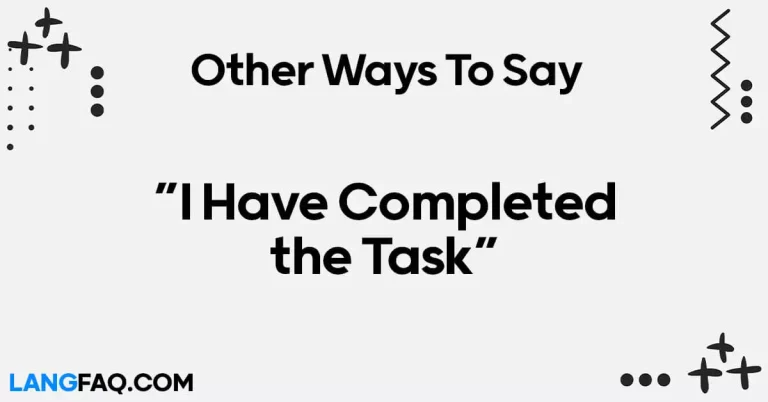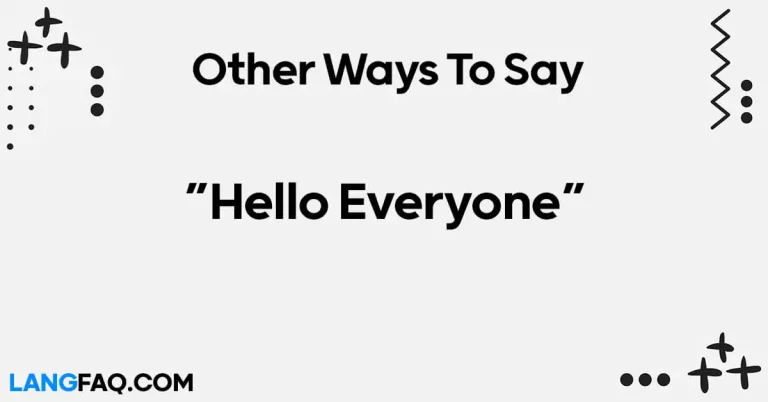Communication is key in any relationship, whether personal or professional. When it comes to conveying that you’ll provide an update or share information later, the phrase “I will let you know” is commonly used. However, diversifying your language can enhance your communication skills and keep conversations fresh. In this article, we’ll explore 12 other ways to say “I will let you know,” offering you a range of alternatives to enrich your vocabulary and effectively convey your message.
12 Other Ways to Say “I Will Let You Know”
Here are 12 other ways to say “I will let you know”:
- I’ll keep you updated.
- I’ll inform you as soon as I have more information.
- I’ll give you the details later.
- I’ll get back to you on that.
- I’ll pass along the information when it’s available.
- I’ll fill you in once I have the facts.
- I’ll notify you once everything is confirmed.
- I’ll loop you in on any developments.
- I’ll clue you in when I know more.
- I’ll shoot you a message once I know for sure.
- I’ll drop you a line once I’ve got it sorted out.
- I’ll clue you in once I’ve got the details ironed out.
Here’s the table with meanings and examples for the 12 other ways to say “I will let you know”:
| Alternative Phrase | Meaning | Example |
|---|---|---|
| I’ll keep you updated. | To provide ongoing information or updates. | “I’ll keep you updated on the project’s progress.” |
| I’ll inform you as soon as I have more information. | To notify someone when additional details become available. | “I’ll inform you as soon as I have more information about the situation.” |
| I’ll give you the details later. | To promise to provide specific information at a later time. | “I’ll give you the details later once I’ve gathered all the necessary information.” |
| I’ll get back to you on that. | To promise to follow up with further information or a decision. | “I’ll get back to you on that after I’ve consulted with the team.” |
| I’ll pass along the information when it’s available. | To promise to share information with someone when it becomes accessible. | “I’ll pass along the information when it’s available.” |
| I’ll fill you in once I have the facts. | To promise to provide someone with the necessary information once it’s confirmed. | “I’ll fill you in once I have the facts about the situation.” |
| I’ll notify you once everything is confirmed. | To promise to inform someone once all details are verified. | “I’ll notify you once everything is confirmed and finalized.” |
| I’ll loop you in on any developments. | To promise to include someone in any updates or changes. | “I’ll loop you in on any developments regarding the project.” |
| I’ll clue you in when I know more. | To promise to share additional information when it becomes available. | “I’ll clue you in when I know more about the situation.” |
| I’ll shoot you a message once I know for sure. | To promise to send a message once information is confirmed. | “I’ll shoot you a message once I know for sure about the meeting time.” |
| I’ll drop you a line once I’ve got it sorted out. | To promise to communicate once a situation is resolved or clarified. | “I’ll drop you a line once I’ve got it sorted out with the logistics.” |
| I’ll clue you in once I’ve got the details ironed out. | To promise to provide details once they’ve been finalized or clarified. | “I’ll clue you in once I’ve got the details ironed out with the schedule.” |
Expanding your vocabulary with these 12 alternative phrases for “I will let you know” can enhance your communication skills and provide clarity in various situations. Each phrase offers a unique way to express your intent to inform or update others, allowing for more effective and engaging communication. Whether in professional or personal settings, having a diverse range of expressions at your disposal ensures that you can convey your message clearly and courteously.
Is It Correct to Say “I Will Let You Know”?
Yes, “I will let you know” is a correct and commonly used phrase in English. It is often used to inform someone that you will provide them with information or updates at a later time. This phrase demonstrates a commitment to communication and keeping the recipient informed about a particular matter. It can be used in both formal and informal contexts, such as in professional settings with colleagues or clients, or in personal interactions with friends or family members. Overall, “I will let you know” is a polite and effective way to indicate that you will provide information or updates as soon as they are available.
Professional Mail Example With “I Will Let You Know”
Subject: Update on Meeting Schedule
Dear [Recipient’s Name],
I hope this email finds you well. I wanted to provide you with an update regarding our upcoming meeting.
Due to unforeseen circumstances, we need to reschedule our meeting originally planned for tomorrow. I apologize for any inconvenience this may cause.
Rest assured, I am currently coordinating with the team to find a suitable alternative date and time that works for everyone involved. I will let you know as soon as we have finalized the new meeting schedule.
Thank you for your understanding and flexibility in this matter. If you have any questions or concerns in the meantime, please feel free to reach out to me.
Best regards, [Your Name]
I’ll Keep You Updated
When you say “I’ll keep you updated,” you’re promising to provide ongoing information or updates to someone. This phrase is versatile and can be used in both formal and informal contexts, making it suitable for various relationships and situations.
Definition and Usage:
“I’ll keep you updated” indicates your commitment to ensuring someone stays informed about a particular topic, project, or situation. It conveys reliability and responsibility, assuring the recipient that they will receive timely updates as developments unfold.
When to Use:
- In professional settings: Use this phrase when communicating with colleagues, clients, or superiors to assure them that you will provide regular updates on a project’s progress or any relevant developments.
- In personal relationships: Employ this phrase when informing friends or family members about ongoing events or changes, keeping them in the loop and involved in your life.
Example Sentence:
“Thank you for your interest in the project. I’ll keep you updated on our progress and any significant milestones we achieve.”
Email Sample:
Subject: Project Update Hi [Recipient’s Name],
I hope this email finds you well. I wanted to touch base and let you know that I’ll keep you updated on the latest developments regarding the project. We’re making good progress, and I’ll ensure you’re informed every step of the way.
Best regards, [Your Name]
Variations:
- Colleague to colleague: “I’ll ensure you’re in the loop.”
- Manager to team member: “I’ll provide regular updates to keep everyone informed.”
- Friend to friend: “I’ll make sure to keep you in the loop about what’s happening.”
Pros and Cons:
Pros:
- Demonstrates professionalism and accountability.
- Builds trust and confidence in your communication.
- Helps maintain transparency and collaboration.
Cons:
- May require consistent effort to provide frequent updates.
- Can become overwhelming if updates are too frequent or unnecessary.
Tips:
- Set clear expectations regarding the frequency and format of updates.
- Use tools like email newsletters or project management software to streamline communication.
- Be proactive in seeking feedback to ensure the updates are meeting the recipient’s needs and expectations.
By incorporating “I’ll keep you updated” into your communication repertoire, you can effectively convey your commitment to keeping others informed and engaged. Whether in the workplace or personal relationships, this phrase demonstrates your professionalism and dedication to clear and transparent communication.
I’ll Inform You as Soon as I Have More Information
“I’ll inform you as soon as I have more information” is a promise to notify someone promptly once additional details become available. This phrase reflects a sense of urgency and responsibility, ensuring that the recipient stays updated as new information emerges.
Definition and Usage:
“I’ll inform you as soon as I have more information” conveys your commitment to keeping someone informed in a timely manner. It implies that you are actively monitoring the situation and will share any relevant updates as soon as they become known.
When to Use:
- In professional contexts: Use this phrase when communicating with colleagues, clients, or stakeholders to reassure them that you are actively gathering information and will keep them informed of any developments.
- In personal interactions: Employ this phrase when discussing ongoing events or situations with friends or family members, demonstrating your commitment to transparency and open communication.
Example Sentence:
“I understand your concern about the project timeline. Rest assured, I’ll inform you as soon as I have more information from the team.”
Email Sample:
Subject: Update on Project Timeline Hi [Recipient’s Name],
I hope this email finds you well. I wanted to provide a quick update on the project timeline. We’re currently in the process of gathering additional information, and I’ll inform you as soon as I have more details to share. Thank you for your patience and understanding.
Best regards, [Your Name]
Variations:
- Manager to team member: “I’ll keep you in the loop as soon as I receive updates.”
- Colleague to colleague: “I’ll make sure to inform you as soon as I have more information.”
- Friend to friend: “I’ll let you know as soon as I have any updates on the situation.”
Pros and Cons:
Pros:
- Demonstrates responsiveness and accountability.
- Helps manage expectations by providing a timeline for updates.
- Builds trust and confidence in your communication.
Cons:
- Relies on your ability to gather information promptly.
- May lead to frustration if updates are delayed or unavailable.
Tips:
- Stay proactive in seeking out information to fulfill your promise of timely updates.
- Communicate any delays or challenges in gathering information to manage expectations effectively.
- Provide regular updates, even if there are no significant developments, to maintain open lines of communication.
By using “I’ll inform you as soon as I have more information” in your communication, you can reassure others that you are actively monitoring the situation and will keep them informed of any changes or updates. This phrase reflects your commitment to transparency and ensures that stakeholders remain engaged and informed throughout the process.
I’ll Give You the Details Later
“I’ll give you the details later” is a promise to provide specific information at a later time. This phrase acknowledges the need for more information but assures the recipient that they will receive all the necessary details in due course.
Definition and Usage:
“I’ll give you the details later” indicates that you have information to share but are unable to do so at the present moment. It acknowledges the recipient’s need for information while assuring them that you will provide a comprehensive update at a later time.
When to Use:
- In professional settings: Use this phrase when discussing projects, plans, or decisions with colleagues or clients, indicating that more detailed information will be forthcoming.
- In personal interactions: Employ this phrase when discussing upcoming events or arrangements with friends or family members, letting them know that you will provide additional details as needed.
Example Sentence:
“I haven’t finalized the itinerary yet, but I’ll give you the details later once everything is confirmed.”
Email Sample:
Subject: Details for Tomorrow’s Meeting Hi [Recipient’s Name],
I hope you’re doing well. I wanted to touch base regarding tomorrow’s meeting. I’m still finalizing a few details, but I’ll give you all the necessary information later today. Thank you for your patience and understanding.
Best regards, [Your Name]
Variations:
- Manager to team member: “I’ll provide you with a full briefing later.”
- Colleague to colleague: “I’ll fill you in on the specifics later today.”
- Friend to friend: “I’ll let you know all the details once I have them sorted out.”
Pros and Cons:
Pros:
- Provides reassurance that detailed information will be shared.
- Allows time for thorough preparation or consideration before sharing details.
- Maintains anticipation and engagement in the conversation.
Cons:
- May lead to uncertainty or impatience if details are not provided in a timely manner.
- Requires follow-through to ensure that information is communicated as promised.
Tips:
- Set a specific timeframe for providing the details to manage expectations effectively.
- Communicate any changes or delays in sharing the information promptly.
- Offer reassurance that the recipient will receive all the necessary details once they are available.
By using “I’ll give you the details later” in your communication, you can acknowledge the recipient’s need for information while ensuring that you have sufficient time to provide a comprehensive update. This phrase demonstrates your commitment to transparency and ensures that stakeholders remain informed and engaged throughout the process.
I’ll Get Back to You on That
“I’ll get back to you on that” is a commitment to follow up with further information or a decision at a later time. This phrase is commonly used in both professional and casual contexts to indicate that you need more time to provide a comprehensive response.
Definition and Usage:
“I’ll get back to you on that” acknowledges the need for additional time to address a particular question, request, or issue. It assures the recipient that you will take their inquiry seriously and provide a thoughtful response or resolution.
When to Use:
- In professional contexts: Use this phrase when responding to inquiries or requests from colleagues, clients, or superiors, indicating that you will provide a thorough response after further consideration or consultation.
- In personal interactions: Employ this phrase when discussing plans, decisions, or arrangements with friends or family members, indicating that you need time to consider their proposal or suggestion before responding.
Example Sentence:
“Thank you for bringing that to my attention. I’ll review the information and get back to you on that by the end of the day.”
Email Sample:
Subject: Follow-up on Meeting Agenda Hi [Recipient’s Name],
I appreciate your input regarding the meeting agenda. I’ll review the suggestions and get back to you on that with any updates or revisions. Thank you for your patience and collaboration.
Best regards, [Your Name]
Variations:
- Manager to team member: “I’ll revisit the proposal and get back to you with my decision.”
- Colleague to colleague: “Let me look into that further and get back to you with an answer.”
- Friend to friend: “I need to check my schedule, but I’ll get back to you on that about our plans for the weekend.”
Pros and Cons:
Pros:
- Provides assurance that the inquiry or request will be addressed promptly.
- Allows time for careful consideration or consultation before providing a response.
- Demonstrates professionalism and commitment to thorough communication.
Cons:
- May lead to frustration if the follow-up response is delayed or overlooked.
- Requires diligence to ensure that the promised follow-up occurs within a reasonable timeframe.
Tips:
- Set a specific deadline for providing the follow-up response to manage expectations effectively.
- Keep track of pending inquiries or requests to ensure that no follow-up falls through the cracks.
- Communicate any delays in providing the follow-up response promptly and offer an alternative timeline if necessary.
By using “I’ll get back to you on that” in your communication, you can acknowledge the recipient’s inquiry or request while ensuring that you have sufficient time to provide a thoughtful and comprehensive response. This phrase demonstrates your commitment to thorough communication and ensures that stakeholders remain informed and engaged throughout the interaction.
I’ll Pass Along the Information When It’s Available
“I’ll pass along the information when it’s available” is a commitment to share information with someone once it becomes accessible. This phrase indicates that you are actively monitoring the situation and will ensure that the recipient is informed when relevant information becomes known.
Definition and Usage:
“I’ll pass along the information when it’s available” assures the recipient that you will keep them informed by sharing relevant details or updates as soon as they are accessible. It reflects your responsibility to ensure that others are kept in the loop and involved in the decision-making process.
When to Use:
- In professional contexts: Use this phrase when discussing projects, reports, or updates with colleagues or stakeholders, indicating that you will provide relevant information as it becomes available.
- In personal interactions: Employ this phrase when discussing plans, events, or news with friends or family members, ensuring that they are kept informed and involved in important matters.
Example Sentence:
“I’m still waiting for confirmation from the client, but I’ll pass along the information as soon as I receive it.”
Email Sample:
Subject: Update on Project Status Hi [Recipient’s Name],
I hope you’re doing well. I wanted to provide a quick update on the project status. We’re currently waiting for some key information, but I’ll pass along the details as soon as they are available. Thank you for your patience and understanding.
Best regards, [Your Name]
Variations:
- Manager to team member: “I’ll ensure that everyone is kept informed by passing along any relevant updates.”
- Colleague to colleague: “Let me know if you need any information, and I’ll pass it along as soon as I have it.”
- Friend to friend: “I’ll keep you in the loop by passing along any news or updates as soon as I hear about them.”
Pros and Cons:
Pros:
- Demonstrates transparency and accountability in communication.
- Ensures that stakeholders are kept informed and involved in decision-making processes.
- Helps maintain trust and collaboration among team members or within personal relationships.
Cons:
- Relies on external factors or sources for information, which may lead to delays in sharing updates.
- Requires follow-through to ensure that the promised information is passed along as soon as it becomes available.
Tips:
- Stay proactive in seeking out information to ensure timely updates for stakeholders.
- Communicate any delays or challenges in obtaining information to manage expectations effectively.
- Encourage open communication and collaboration among team members or within personal relationships to facilitate the sharing of information.
By using “I’ll pass along the information when it’s available” in your communication, you can reassure others that you are actively monitoring the situation and will ensure that they are kept informed as soon as relevant information becomes known. This phrase demonstrates your commitment to transparency and ensures that stakeholders remain engaged and involved in important matters.
I’ll Fill You In Once I Have the Facts
“I’ll fill you in once I have the facts” is a commitment to provide someone with all the necessary information once it’s confirmed. This phrase implies that you are actively gathering information and will ensure that the recipient is fully informed once the details are verified.
Definition and Usage:
“I’ll fill you in once I have the facts” indicates your commitment to providing comprehensive information once all relevant details have been confirmed. It assures the recipient that you are taking the necessary steps to gather accurate information before sharing updates.
When to Use:
- In professional settings: Use this phrase when discussing projects, reports, or decisions with colleagues or clients, indicating that you will provide a thorough update once all the facts are known.
- In personal interactions: Employ this phrase when discussing events, plans, or news with friends or family members, ensuring that they receive accurate and complete information.
Example Sentence:
“I’m still waiting for the latest data from the research team, but I’ll fill you in once I have all the facts.”
Email Sample:
Subject: Update on Project Status Hi [Recipient’s Name],
I hope this email finds you well. I wanted to provide a quick update on the project status. We’re currently gathering additional data, and I’ll fill you in once we have all the facts confirmed. Thank you for your patience and understanding.
Best regards, [Your Name]
Variations:
- Manager to team member: “I’ll ensure that everyone is fully informed by providing all the relevant facts once they are confirmed.”
- Colleague to colleague: “Let me gather all the necessary information, and I’ll fill you in on the details as soon as I have them.”
- Friend to friend: “I’ll keep you updated on the situation and fill you in with all the facts once I have them sorted out.”
Pros and Cons:
Pros:
- Demonstrates a commitment to providing accurate and complete information.
- Builds trust and confidence in your communication by ensuring that recipients are fully informed.
- Helps avoid misunderstandings or miscommunications by providing all relevant facts upfront.
Cons:
- May require additional time to gather and verify all the necessary information before sharing updates.
- Relies on external factors or sources for information, which may lead to delays in providing updates.
Tips:
- Stay proactive in gathering information to ensure that updates can be provided promptly once the facts are confirmed.
- Communicate any delays or challenges in obtaining information to manage expectations effectively.
- Encourage open communication and collaboration among team members or within personal relationships to facilitate the sharing of information.
By using “I’ll fill you in once I have the facts” in your communication, you can reassure others that you are actively working to gather accurate information and will ensure that they are fully informed once the details are confirmed. This phrase demonstrates your commitment to transparency and ensures that stakeholders remain engaged and involved in important matters.
I’ll Notify You Once Everything Is Confirmed
“I’ll notify you once everything is confirmed” is a commitment to inform someone once all details are verified and finalized. This phrase indicates that you are actively monitoring the situation and will ensure that the recipient is promptly informed of any updates or changes.
Definition and Usage:
“I’ll notify you once everything is confirmed” assures the recipient that you will keep them informed once all relevant details have been verified and finalized. It reflects your responsibility to ensure that others are kept in the loop and involved in the decision-making process.
When to Use:
- In professional contexts: Use this phrase when discussing projects, decisions, or updates with colleagues, clients, or stakeholders, indicating that you will provide a comprehensive update once everything is confirmed.
- In personal interactions: Employ this phrase when discussing plans, events, or arrangements with friends or family members, ensuring that they are kept informed and involved in important matters.
Example Sentence:
“We’re still waiting for approval from the finance department, but I’ll notify you once everything is confirmed.”
Email Sample:
Subject: Update on Project Approval Hi [Recipient’s Name],
I hope you’re doing well. I wanted to provide a quick update on the project approval process. We’re currently awaiting confirmation from the finance department, but I’ll notify you once everything is confirmed. Thank you for your patience and understanding.
Best regards, [Your Name]
Variations:
- Manager to team member: “I’ll ensure that everyone is promptly notified once the details are finalized.”
- Colleague to colleague: “I’ll keep you in the loop and notify you as soon as everything is confirmed.”
- Friend to friend: “I’ll let you know once everything is confirmed, and we can finalize our plans.”
Pros and Cons:
Pros:
- Provides reassurance that recipients will be promptly informed once all details are finalized.
- Demonstrates accountability and responsibility in communication.
- Helps maintain transparency and trust among stakeholders or within personal relationships.
Cons:
- Relies on external factors or sources for confirmation, which may lead to delays in providing updates.
- Requires follow-through to ensure that recipients are notified promptly once everything is confirmed.
Tips:
- Stay proactive in following up with relevant parties to expedite the confirmation process.
- Communicate any delays or challenges in obtaining confirmation to manage expectations effectively.
- Offer reassurance that recipients will be promptly notified once everything is confirmed to maintain transparency and trust.
By using “I’ll notify you once everything is confirmed” in your communication, you can reassure others that you are actively monitoring the situation and will ensure that they are promptly informed once all details are verified and finalized. This phrase demonstrates your commitment to transparency and ensures that stakeholders remain engaged and involved in important matters.
I’ll Loop You In on Any Developments
“I’ll loop you in on any developments” is a commitment to include someone in any updates or changes that occur. This phrase indicates that you value the recipient’s involvement and will ensure that they are kept informed of any significant developments.
Definition and Usage:
“I’ll loop you in on any developments” assures the recipient that you will keep them informed by including them in any updates, changes, or progress that occurs. It reflects your commitment to transparency and collaboration in communication.
When to Use:
- In professional contexts: Use this phrase when discussing projects, initiatives, or updates with colleagues, clients, or stakeholders, indicating that you will ensure their involvement by keeping them informed of any developments.
- In personal interactions: Employ this phrase when discussing plans, events, or news with friends or family members, ensuring that they feel included and informed about important matters.
Example Sentence:
“We’re still in the early stages of the project, but I’ll loop you in on any developments as they occur.”
Email Sample:
Subject: Project Update and Involvement Hi [Recipient’s Name],
I hope this email finds you well. I wanted to provide a quick update on the project and assure you that I’ll loop you in on any developments as they occur. Your involvement and input are valuable to us, and we want to ensure that you’re kept informed every step of the way.
Best regards, [Your Name]
Variations:
- Manager to team member: “I’ll keep you in the loop on any developments to ensure your continued involvement.”
- Colleague to colleague: “I’ll make sure to include you in any updates or changes that arise.”
- Friend to friend: “I’ll loop you in on any developments with our plans so that you’re kept in the loop.”
Pros and Cons:
Pros:
- Demonstrates inclusivity and collaboration in communication.
- Ensures that stakeholders feel valued and involved in important matters.
- Facilitates transparency and trust among team members or within personal relationships.
Cons:
- Requires diligence to ensure that all relevant parties are kept informed of any developments.
- May lead to information overload if updates are too frequent or unnecessary.
Tips:
- Set clear expectations regarding the frequency and format of updates to manage stakeholders’ involvement effectively.
- Use tools like email newsletters or project management software to streamline communication and keep everyone in the loop.
- Encourage open communication and feedback to ensure that stakeholders feel valued and engaged throughout the process.
By using “I’ll loop you in on any developments” in your communication, you can assure others that you value their involvement and will ensure that they are kept informed of any significant updates or changes. This phrase demonstrates your commitment to transparency and collaboration and ensures that stakeholders remain engaged and involved in important matters.
I’ll Clue You In When I Know More
“I’ll clue you in when I know more” is a commitment to share additional information once it becomes available. This phrase implies that you are actively gathering information and will ensure that the recipient is informed when you have more details.
Definition and Usage:
“I’ll clue you in when I know more” assures the recipient that you will keep them informed by providing additional information or insights once they are available. It reflects your commitment to transparency and openness in communication.
When to Use:
- In professional contexts: Use this phrase when discussing projects, decisions, or updates with colleagues, clients, or stakeholders, indicating that you will provide further details once you have more information.
- In personal interactions: Employ this phrase when discussing plans, events, or news with friends or family members, ensuring that they are kept informed and involved in important matters.
Example Sentence:
“I’ve just started researching the topic, but I’ll clue you in when I know more.”
Email Sample:
Subject: Update on Research Progress Hi [Recipient’s Name],
I hope you’re doing well. I wanted to provide a quick update on the research project. I’ve started gathering information, and I’ll clue you in when I know more. Thank you for your patience and support.
Best regards, [Your Name]
Variations:
- Manager to team member: “I’ll ensure that you’re kept in the loop and clued in on any new developments.”
- Colleague to colleague: “Let me do some more digging, and I’ll clue you in on what I find.”
- Friend to friend: “I’ll keep you updated on the situation and clue you in once I have more information.”
Pros and Cons:
Pros:
- Demonstrates transparency and openness in communication.
- Assures recipients that they will be kept informed once more information becomes available.
- Facilitates collaboration and engagement among team members or within personal relationships.
Cons:
- Relies on your ability to gather information and provide updates in a timely manner.
- May lead to frustration if updates are delayed or if there is a lack of follow-through on sharing additional information.
Tips:
- Stay proactive in gathering information to ensure timely updates for stakeholders.
- Communicate any delays or challenges in obtaining information to manage expectations effectively.
- Encourage open communication and collaboration to facilitate the sharing of information and insights.
By using “I’ll clue you in when I know more” in your communication, you can reassure others that you are actively gathering information and will ensure that they are informed once you have more details. This phrase demonstrates your commitment to transparency and openness and ensures that stakeholders remain engaged and involved in important matters.
I’ll Keep You Posted on Any Changes
“I’ll keep you posted on any changes” is a commitment to provide updates regarding any alterations or developments. This phrase assures the recipient that they will be kept informed of any relevant changes or updates as they occur.
Definition and Usage:
“I’ll keep you posted on any changes” indicates your intention to provide regular updates regarding any alterations, developments, or progress. It reflects your commitment to transparency and ensures that the recipient remains informed throughout the process.
When to Use:
- In professional contexts: Use this phrase when discussing projects, timelines, or decisions with colleagues, clients, or stakeholders, indicating that you will provide ongoing updates on any changes or developments.
- In personal interactions: Employ this phrase when discussing plans, events, or arrangements with friends or family members, ensuring that they are kept informed of any updates or changes.
Example Sentence:
“We’re still finalizing the details, but I’ll keep you posted on any changes.”
Email Sample:
Subject: Update on Project Status Hi [Recipient’s Name],
I hope this email finds you well. I wanted to provide a quick update on the project status. We’re currently in the process of finalizing some details, but I’ll keep you posted on any changes as they occur. Thank you for your patience and understanding.
Best regards, [Your Name]
Variations:
- Manager to team member: “I’ll ensure that you’re kept in the loop and posted on any new developments.”
- Colleague to colleague: “Let me know if you need any updates, and I’ll keep you posted on any changes.”
- Friend to friend: “I’ll keep you updated on the situation and post any changes as they happen.”
Pros and Cons:
Pros:
- Demonstrates proactive communication and transparency.
- Assures recipients that they will be kept informed of any relevant changes or developments.
- Helps maintain trust and collaboration among team members or within personal relationships.
Cons:
- Relies on your ability to provide timely updates as changes occur.
- May lead to information overload if updates are too frequent or unnecessary.
Tips:
- Set clear expectations regarding the frequency and format of updates to manage recipients’ expectations effectively.
- Use tools like email newsletters or project management software to streamline communication and keep everyone in the loop.
- Encourage open communication and feedback to ensure that recipients feel valued and engaged throughout the process.
By using “I’ll keep you posted on any changes” in your communication, you can assure others that you are committed to keeping them informed of any updates or alterations as they occur. This phrase demonstrates your proactive approach to communication and ensures that stakeholders remain engaged and involved in important matters.
I’ll Share Updates with You as They Become Available
“I’ll share updates with you as they become available” is a commitment to provide ongoing information as it becomes accessible. This phrase indicates that you will keep the recipient informed by sharing updates or changes as they occur.
Definition and Usage:
“I’ll share updates with you as they become available” assures the recipient that you will keep them informed by providing updates or information as it becomes accessible. It reflects your commitment to transparency and ensures that the recipient remains informed throughout the process.
When to Use:
- In professional contexts: Use this phrase when discussing projects, reports, or decisions with colleagues, clients, or stakeholders, indicating that you will provide ongoing updates as new information becomes available.
- In personal interactions: Employ this phrase when discussing plans, events, or news with friends or family members, ensuring that they are kept informed of any updates or changes.
Example Sentence:
“We’re still awaiting feedback from the client, but I’ll share updates with you as they become available.”
Email Sample:
Subject: Update on Project Status Hi [Recipient’s Name],
I hope you’re doing well. I wanted to provide a quick update on the project status. We’re currently awaiting feedback from the client, but I’ll share updates with you as they become available. Thank you for your patience and understanding.
Best regards, [Your Name]
Variations:
- Manager to team member: “I’ll ensure that you’re kept informed by sharing updates with you as soon as they’re available.”
- Colleague to colleague: “I’ll keep you in the loop by sharing any updates with you as they become accessible.”
- Friend to friend: “I’ll let you know about any updates as soon as I hear about them.”
Pros and Cons:
Pros:
- Demonstrates proactive communication and transparency.
- Assures recipients that they will be kept informed of any relevant updates or changes.
- Helps maintain trust and collaboration among team members or within personal relationships.
Cons:
- Relies on your ability to provide timely updates as information becomes available.
- May lead to frustration if updates are delayed or if there is a lack of follow-through on sharing information.
Tips:
- Stay proactive in gathering information to ensure timely updates for recipients.
- Communicate any delays or challenges in obtaining information to manage expectations effectively.
- Encourage open communication and feedback to ensure that recipients feel valued and engaged throughout the process.
By using “I’ll share updates with you as they become available” in your communication, you can assure others that you are committed to keeping them informed of any updates or changes as they occur. This phrase demonstrates your proactive approach to communication and ensures that stakeholders remain engaged and involved in important matters.
I’ll Keep You in the Loop on Any Developments
“I’ll keep you in the loop on any developments” is a commitment to provide ongoing updates regarding any new developments or changes. This phrase assures the recipient that they will be kept informed and involved throughout the process.
Definition and Usage:
“I’ll keep you in the loop on any developments” indicates your intention to ensure that the recipient remains informed by providing updates on any new developments or changes. It reflects your commitment to transparency and collaboration in communication.
When to Use:
- In professional contexts: Use this phrase when discussing projects, initiatives, or updates with colleagues, clients, or stakeholders, indicating that you will keep them informed and involved in the decision-making process.
- In personal interactions: Employ this phrase when discussing plans, events, or news with friends or family members, ensuring that they feel included and informed about important matters.
Example Sentence:
“We’re still in the planning stages, but I’ll keep you in the loop on any developments.”
Email Sample:
Subject: Update on Project Progress Hi [Recipient’s Name],
I hope this email finds you well. I wanted to provide a quick update on the project progress. We’re still in the planning stages, but I’ll keep you in the loop on any developments. Your input and involvement are important to us, and we want to ensure that you’re kept informed throughout the process.
Best regards, [Your Name]
Variations:
- Manager to team member: “I’ll make sure to keep you in the loop on any new developments to ensure your continued involvement.”
- Colleague to colleague: “I’ll keep you in the loop and provide updates as soon as I have them.”
- Friend to friend: “I’ll let you know about any updates as soon as I hear about them so that you’re in the loop.”
Pros and Cons:
Pros:
- Demonstrates inclusivity and collaboration in communication.
- Assures recipients that they will be kept informed and involved throughout the process.
- Facilitates transparency and trust among team members or within personal relationships.
Cons:
- Relies on your ability to provide timely updates and follow through on keeping recipients informed.
- May lead to information overload if updates are too frequent or unnecessary.
Tips:
- Set clear expectations regarding the frequency and format of updates to manage recipients’ involvement effectively.
- Use tools like email newsletters or project management software to streamline communication and keep everyone in the loop.
- Encourage open communication and feedback to ensure that recipients feel valued and engaged throughout the process.
By using “I’ll keep you in the loop on any developments” in your communication, you can assure others that you are committed to keeping them informed and involved throughout the process. This phrase demonstrates your proactive approach to communication and ensures that stakeholders remain engaged and informed about important matters.
FAQs
How can I politely say “I will let you know”? There are several polite alternatives to “I will let you know,” including phrases like “I’ll keep you posted,” “I’ll inform you,” or “I’ll pass along the information.”
Is it necessary to inform someone if there are no updates? Yes, it’s courteous to keep others informed, even if there are no updates. You can simply say, “There are no updates at this time, but I’ll let you know if anything changes.”
What’s the difference between “I’ll let you know” and “I’ll inform you”? “I’ll let you know” is a more general phrase, while “I’ll inform you” implies a more formal communication style. The choice between them depends on the context and your relationship with the recipient.
Can I use these alternatives in professional settings? Yes, many of these alternatives are suitable for professional settings, especially when communicating with colleagues, clients, or superiors. However, it’s essential to gauge the formality of the situation and choose your words accordingly.
How can I remember these alternatives? You can practice using these phrases in your daily conversations or write them down in a notebook for reference. Over time, they’ll become a natural part of your vocabulary.
What if English isn’t my first language? If English isn’t your first language, don’t worry! You can still incorporate these phrases into your communication by practicing regularly and seeking feedback from native speakers.
Conclusion
Expanding your repertoire of phrases for communicating updates or information can enhance your communication skills and make your conversations more engaging. By incorporating these 12 alternatives to “I will let you know” into your vocabulary, you’ll be better equipped to express yourself effectively in various situations.
Remember, effective communication is about clarity, courtesy, and consideration for others. So, whether you’re interacting with colleagues, clients, or friends, choose your words thoughtfully to ensure your message is understood and appreciated.







